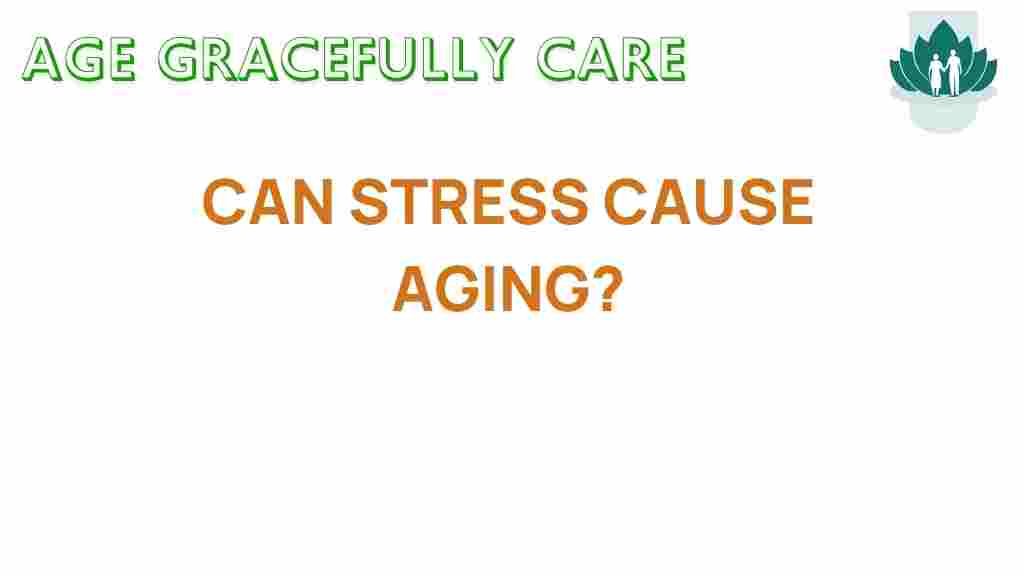Can Stress Accelerate the Aging Process? Unraveling the Connection
In today’s fast-paced world, stress has become a common experience for many individuals. The demands of work, family, and social obligations can take a toll on both mental and physical health. One of the most concerning implications of chronic stress is its potential impact on the aging process. This article explores the intricate relationship between stress, aging, and health by examining the biological effects of stress, the role of cortisol, and strategies for resilience and lifestyle changes.
The Biological Effects of Stress on Aging
Stress triggers a cascade of biological responses in the body. When faced with a stressful situation, the body releases hormones, including cortisol, which is often referred to as the “stress hormone.” While cortisol is essential for various bodily functions, chronic exposure can lead to detrimental effects on health and accelerate the aging process.
- Cortisol and Aging: Elevated cortisol levels can lead to cellular damage over time. This damage is primarily due to oxidative stress, where free radicals attack cells, leading to inflammation and impaired cellular function.
- Telomere Shortening: Telomeres are protective caps at the ends of chromosomes that shorten as we age. Research has shown that chronic stress can accelerate telomere shortening, which is associated with aging and increased risk of age-related diseases.
- Immune System Suppression: Chronic stress can weaken the immune system, making the body more susceptible to infections and diseases that can contribute to the aging process.
How Stress Impacts Mental Well-being and Physical Health
The connection between stress and aging extends beyond biological effects; it also significantly influences mental well-being. Prolonged stress can lead to mental health issues such as anxiety, depression, and cognitive decline, all of which can contribute to a perceived acceleration of aging.
- Impact on Mood: Stress can lead to mood swings and irritability, which can decrease overall life satisfaction.
- Cognitive Decline: Chronic stress is linked to memory problems and reduced cognitive function, which can make individuals feel older than they are.
- Physical Health Issues: Stress is associated with a variety of health problems such as heart disease, hypertension, and obesity, all of which can negatively impact the aging process.
The Role of Lifestyle in Managing Stress and Aging
While we cannot eliminate stress entirely, we can adopt lifestyle choices that mitigate its effects on aging. Here are some effective strategies:
- Regular Exercise: Physical activity is one of the most effective ways to reduce stress. Exercise releases endorphins, which improve mood and promote better health.
- Healthy Diet: A balanced diet rich in antioxidants, vitamins, and minerals can help combat oxidative stress. Foods like berries, leafy greens, and nuts are particularly beneficial.
- Mindfulness and Meditation: Practices such as meditation and mindfulness can help manage stress levels and promote mental well-being.
- Social Connections: Maintaining strong relationships and a support network can provide emotional support and reduce feelings of isolation.
Building Resilience Against Stress
Resilience is the ability to bounce back from adversity and manage stress effectively. Here are some tips on how to cultivate resilience:
- Develop a Positive Mindset: Focusing on positive outcomes and practicing gratitude can help shift your perspective on stressors.
- Set Realistic Goals: Break tasks into manageable steps to avoid feeling overwhelmed.
- Learn Problem-Solving Skills: Effective problem-solving can help you address stressors directly, reducing their impact on your life.
- Seek Professional Help: If stress becomes overwhelming, consider talking to a mental health professional for guidance and support.
Common Troubleshooting Tips for Managing Stress
Here are some troubleshooting tips to help manage stress effectively:
- Identify Stress Triggers: Keep a journal to track stressful events and identify patterns.
- Practice Deep Breathing: Simple breathing exercises can help calm the nervous system.
- Limit Caffeine and Alcohol: Both substances can exacerbate stress and anxiety.
- Establish a Routine: A consistent daily routine can provide structure and predictability, reducing stress levels.
The Importance of Seeking Balance
In our quest to manage stress and its effects on aging, it is essential to find balance in life. Striving for perfection can lead to increased stress, so it is crucial to prioritize self-care and recognize when to take a step back.
Engaging in hobbies, spending time in nature, and ensuring adequate rest are vital components of maintaining overall health and well-being. Additionally, consider exploring resources that offer guidance on stress management and mental health. For more information, visit this helpful resource.
Conclusion: Embracing a Healthier Future
Understanding the connection between stress and the aging process is crucial for promoting long-term health. While stress is an inevitable part of life, its impact on aging can be managed through proactive lifestyle choices, building resilience, and prioritizing mental well-being. By taking steps to reduce stress, individuals can enhance their quality of life and potentially slow down the aging process.
Incorporating these strategies into your daily routine can lead to a healthier mindset and body. Remember, it is not just about adding years to your life but about adding life to your years. With the right tools and mindset, you can navigate stress effectively and age gracefully.
For further insights into health and well-being, explore related articles on our website that delve into the importance of mental health and lifestyle choices.
This article is in the category Health and created by AgeGracefullyCare Team
